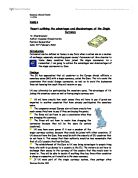It is ironic though, as Germany are having major difficulties economically and consequently are borrowing more than 3% of their GDP. This was due to the joining of rich West Germany and poorer East Germany when the Berlin wall collapsed in Nov 1989. Chancellor Kohl wanted the joining of Germany, the proud German’s plan was to unite Germany and make them a leading state within Europe. Mitterrand the French President said that he would help in unification (by persuading other states) if Kohl worked with him in Delors plan (The poor East Germany is bringing the whole of Germanys economy down).
The European Commission implements the growth and stability pact rule. When Ireland and Greece broke the growth and stability pact they were fined and in a sense ‘told-off’. Germany and France- the two biggest nations in the E.U have broken this pact and it is only recently (14/01/04) that something has been done about it. There can’t be different rules for smaller states and larger states as It undermines the whole idea of the E.U! It is difficult for the European Commission to fine these two states. It would require them to borrow even more money to pay off these fines. It is ultimately wrong for them to break the rules and have different rules for different states, but the last thing needed is Germany and France in recession. It will result in major trading parties breaking in the E.U, it will bring Germany and France’s economy down and they will bring the rest of the E.U states with them, because they are the foundations for the other economies in Europe due to their shear size and large population. Maybe the rule is to strict and should be changed, but this would cause speculators to see the Euro as weak, and sell it, this would result in a collapse of the euro and a collapse in all European states economies.
The single European currency in itself is a success in it actually coming about. Devaluisation isn’t present between member states, as everyone knows the value of the Euro. For example a person in Greece can go on holiday to Spain and know if they are getting their money’s worth as they won’t have to translate and work the sums out in their head, they’ll know automatically.
However it is unsuccessful due to the interest rates. The rules are essential for it to work and Germany and France have broken them. Also for example in Ireland interest rates could be high to stop people buying so much. In Germany interest rates could be low to influence people to buy products. It would be easy to deal with it if it was a single state but with a joint currency you can’t have both high and low interest rates! The ECB are neutral and have to decide interest rates for the good of all European states not for just one state. Many thought that as the ECB is stationed in Germany and is managed by Germans that it would look at what’s best for Germany; but they obviously aren’t, with Germany’s economy doing so poorly. The Euro is also unsuccessful because political sovereignty is taken away from the member states and they don’t have control over financial issues. Sovereignty has been pooled in Europe.
The main reason that Britain don’t join the euro (apart from Thatcher detesting Delors and the removal of sovereignty from Westminster) was the Growth and Stability pact. Many of the general public in the UK remember Black Wednesday in 1992 where we followed the strict ERM rules. John Major didn’t devalue the pound and interest rates rose. Everything became very expensive and unemployment levels also rose. Many fear this may be what will happen if we join the single European currency as it stands.
Furthermore the Growth and Stability pact may be too strict an idea. At present Chancellor Gordon Brown doesn’t agree with it and he has the view that it is acceptable to borrow too much when you are in recession as long as you pay the money back in an economic upturn (certain amount of time). This method if adopted in Europe would give more flexibility to the Euro and the distance in which the UK may join the single European currency may be shortened.







